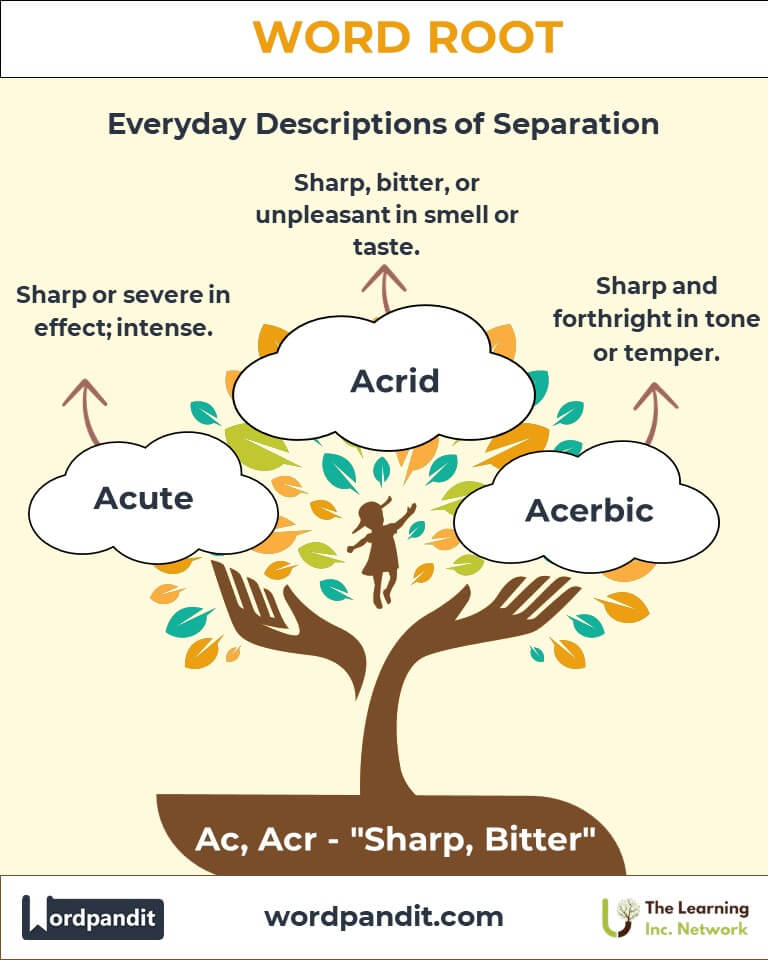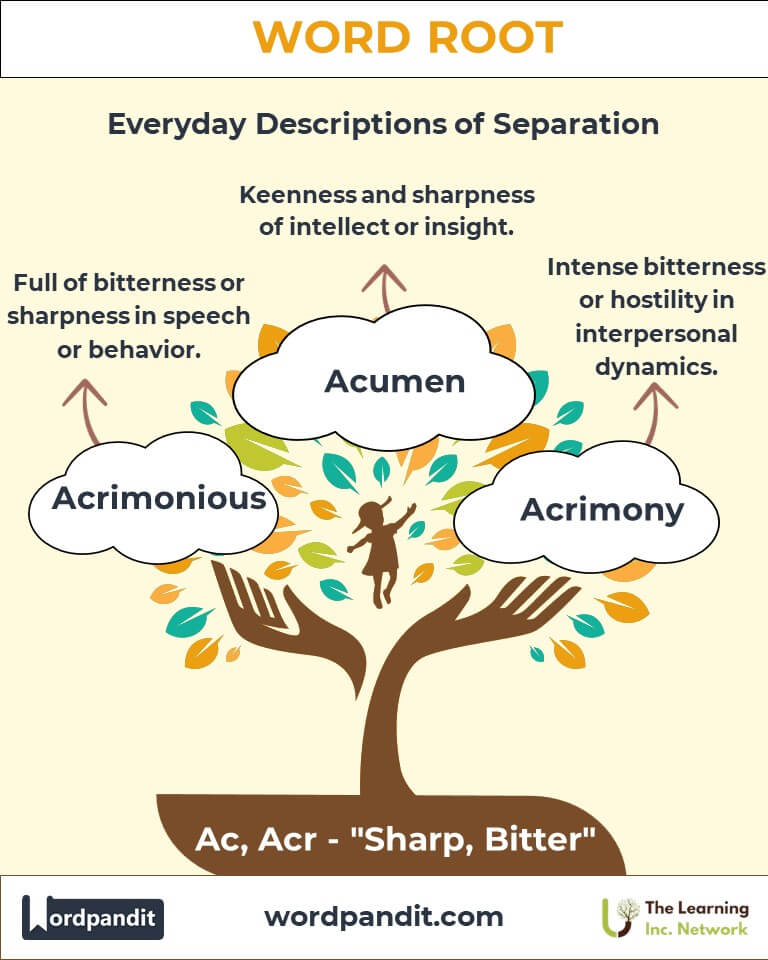Ac, Acr: The Edge of Sharpness in Language and Thought
Dive into the roots "ac" and "acr," derived from Latin, meaning "sharp" or "bitter." From vivid expressions of acute sensations to acrid critiques, these roots have carved their sharpness into language, bridging vivid imagery with precise communication.

Table of Contents
- Introduction: The Essence of Ac and Acr
- Etymology and Historical Journey
- Mnemonic: Unlocking the Power of Ac and Acr
- Common Ac, Acr-Related Terms
- Ac and Acr Through Time
- Ac and Acr in Specialized Fields
- Illustrative Story: Ac and Acr in Action
- Cultural Significance of Ac and Acr
- The Ac and Acr Family Tree
- FAQs about the Ac and Acr Word Roots
- Test Your Knowledge: Ac and Acr Mastery Quiz
- Conclusion: The Sharp Legacy of Ac and Acr
Introduction: The Essence of Ac and Acr
What do the sting of an acrid smell and the sharpness of an acute angle have in common? They both stem from the roots "ac" and "acr," which trace back to the Latin "acer," meaning sharp, bitter, or pointed. These roots shape words that evoke clarity, precision, and intensity in sensation or expression.

Etymology and Historical Journey
The roots "ac" and "acr" derive from the Latin "acer," originally describing sharp or pointed objects and intense sensations. Over centuries, the meanings expanded into metaphors of intellectual sharpness and emotional intensity. With their transition into English, these roots began forming terms that convey physical, sensory, and abstract sharpness.
Mnemonic: Unlocking the Power of Ac and Acr
Picture a sharp-tipped quill dipped into acrid ink, writing acute observations.
Mnemonic Device: "Ac and Acr are the sharp points that pierce clarity and bitterness into words."
Common Ac, Acr-Related Terms
- Acute (uh-kyoot)
- Meaning: Sharp or severe in effect; intense.
- Example: The patient experienced acute pain after the surgery.
- Acrid (ak-rid)
- Meaning: Sharp, bitter, or unpleasant in smell or taste.
- Example: The acrid smell of burning rubber filled the air.
- Acerbic (uh-ser-bik)
- Meaning: Sharp and forthright in tone or temper.
- Example: The critic’s acerbic comments left the audience unsettled.
- Acrimonious (ak-ruh-moh-nee-uhs)
- Meaning: Full of bitterness or sharpness in speech or behavior.
- Example: The debate became increasingly acrimonious as tempers flared.
- Acumen (ak-yoo-men)
- Meaning: Keenness and sharpness of intellect or insight.
- Example: Her business acumen propelled the company to new heights.
Ac and Acr Through Time
- Acerbic: Once used primarily to describe sour or bitter tastes, it evolved to include sharpness in tone or demeanor.
- Acute: Originally used in geometry to describe angles, it expanded into medical and general language to describe intensity or immediacy.
Ac and Acr in Specialized Fields
Medicine:
- Acute: Refers to conditions or diseases that appear suddenly and with severe symptoms (e.g., acute appendicitis).
Psychology:
- Acrimony: Describes intense bitterness or hostility in interpersonal dynamics.
Business:
- Acumen: Refers to sharp decision-making skills crucial in competitive fields.
Illustrative Story: Ac and Acr in Action
In the bustling newsroom, journalist Mia was known for her acumen and acerbic wit. One day, an acrimonious exchange with a rival editor over an acute editorial deadline left her colleagues in stunned silence. Later, the acrid smell of burnt coffee in the breakroom served as a bitter metaphor for their tense atmosphere.
Cultural Significance of Ac and Acr
The sharpness of "ac" and "acr" resonates deeply in both literal and metaphorical contexts. From the cutting remarks of political debates to the precision of medical diagnoses, these roots reflect our fascination with clarity and intensity.

The Ac and Acr Family Tree
- Acid (sharp or sour): Examples: Acidic, acidity.
- Acri (sharp or bitter): Examples: Acrimony, acrimonious.
- Acerb (sharp or harsh): Examples: Acerbic, exacerbate.

FAQs About the Ac and Acr Word Roots
Q: What do "ac" and "acr" mean?
A: "Ac" and "acr" are derived from the Latin root "acer," which means sharp, bitter, or pointed. These roots are used to describe intensity or sharpness, whether in physical sensations, smells, tastes, or intellectual qualities. For instance, "acrid" refers to a sharp or bitter smell, while "acumen" describes sharpness of intellect.
Q: What is the origin of "acrimonious"?
A: The word "acrimonious" comes from the Latin term "acrimonia," which refers to sharpness or severity. It entered English to describe bitterness in speech or behavior. Acrimonious exchanges often convey hostility or sharp criticism, commonly seen in heated debates or arguments.
Q: How is "acute" used in medicine?
A: In medical terminology, "acute" describes conditions or diseases that arise suddenly and with significant intensity or severity. For example, "acute appendicitis" refers to a rapid onset of severe symptoms requiring immediate attention. It contrasts with "chronic," which refers to long-lasting conditions.
Q: Are "acrid" and "acerbic" synonyms?
A: While both words share the root meaning sharp or bitter, they differ in usage: "Acrid" typically refers to unpleasant smells or tastes, like the acrid odor of smoke. "Acerbic" describes sharpness or harshness in tone or behavior, such as acerbic remarks in a conversation.
Q: What does "acumen" mean, and how is it used?
A: "Acumen" refers to sharpness of insight, judgment, or understanding. It’s commonly used in professional contexts to praise someone's ability to make quick, effective decisions. For example, "Her financial acumen helped the company navigate a challenging market."
Q: What is the difference between "acute" and "chronic"?
A: Acute describes something intense or severe that occurs suddenly, like an acute illness or acute pain. Chronic refers to conditions that develop over time and persist for a long duration, such as chronic back pain.
Q: How does "acrimonious" relate to interpersonal dynamics?
A: "Acrimonious" describes bitterness or hostility in interactions. Acrimonious disputes often arise in legal battles, political debates, or personal conflicts, characterized by sharp criticism and harsh tones.
Q: Can "acerbic" be positive?
A: While "acerbic" typically has a negative connotation, describing harsh or biting remarks, it can be positive in specific contexts. For example, an acerbic wit might be appreciated for its sharp humor or cleverness, especially in satire.
Test Your Knowledge: Ac and Acr Mastery Quiz
1. What does "acute" mean?
2. Which word describes a sharp smell?
3. What is "acrimony"?
4. What is the difference between "acute" and "chronic"?
5. Which word best describes sharpness in tone?
Conclusion: The Sharp Legacy of Ac and Acr
The roots "ac" and "acr" cut through the fabric of language, shaping expressions of sharpness, intensity, and bitterness. Whether describing acute challenges or acrid sensations, their enduring relevance reflects the vivid and precise edges of human experience.














